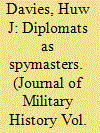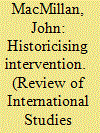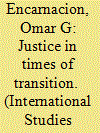|
|
|
Sort Order |
|
|
|
Items / Page
|
|
|
|
|
|
|
| Srl | Item |
| 1 |
ID:
116768


|
|
|
|
|
| Publication |
2012.
|
| Summary/Abstract |
During the Peninsular War, General Lord Wellington orchestrated and utilised one of the most sophisticated intelligence collection apparatuses of the nineteenth century. Not only was the intelligence collected by his own personnel made available to him, but so too was that collected by a group of civilian agents recruited and controlled by the British diplomats in Portugal and Spain, Charles Stuart and Henry Wellesley. This article analyses the organisation and evolution of these intelligence networks during the critical years of the Peninsular War. It then explains the impact of this intelligence on Wellington's military planning, specifically focusing on the opening campaigns of 1812. It then locates the historical importance of the intelligence networks developed in the Iberian Peninsula, by comparing them with later examples during the Crimean War (1853-56), and preceding the outbreak of the First World War (1914-18)
|
|
|
|
|
|
|
|
|
|
|
|
|
|
|
|
| 2 |
ID:
124132


|
|
|
|
|
| Publication |
2013.
|
| Summary/Abstract |
This article identifies three key themes in British intervention for purposes of liberal reordering in the period 1815-50, namely the 'opening-up' of new market spaces (discussed in relation to Uruguay/the Argentine Confederation in the 1840s), a cosmopolitan humanitarianism evident in the campaign for the abolition of the Atlantic slave trade that ran throughout this period, and the political-ideological contest between constitutionalist and absolutist forces and represented here by intervention in the Iberian Peninsula in the late 1820s to1830s. In developing a strategic perspective upon military/naval intervention the analysis shows its utility to have been subordinate to more fundamental sociopolitical, cultural, and institutional determinants. With regard to understanding the outcomes of specific intervention the analysis shows the importance of systematically evaluating developments in the domestic political environments of both intervening and target state as well as the military campaign itself and the need for sufficient general alignment or synchronisation in the timeline of developments in each of these three domains. This model helps to explain that whilst liberal interventions are not necessarily bound to fail, they frequently prove more difficult, complex, and protracted than the interveners expect.
|
|
|
|
|
|
|
|
|
|
|
|
|
|
|
|
| 3 |
ID:
111748


|
|
|
|
|
| Publication |
2012.
|
| Summary/Abstract |
A key contention of the transitional justice movement is that the more comprehensive and vigorous the effort to bring justice to a departed authoritarian regime for its political crimes, the better the democratization results. This essay challenges this common assumption with empirical evidence from the Iberian Peninsula, where the global wave of democratization of the late twentieth century was born. In Portugal, political trials and bureaucratic purges intended to cleanse the state and society of the authoritarian past nearly derailed the transition to democracy by descending into a veritable political witch-hunt. In Spain, by contrast, forgetting and moving on prevailed, an approach that facilitated the country's emergence as the paradigmatic example of a successful democratic transition. Among the many lessons suggested by these counter-intuitive examples is that there is no pre-ordained outcome to any attempt at transitional justice. This is so because the principal factors driving the impulse toward justice against an old regime tend to be political in nature rather than ethical or legal. In Portugal, the rise of transitional justice mirrored the radicalism of the left-wing revolution that launched the transition to democracy. In Spain, the absence of transitional justice reflected the pragmatism imposed by the self-reinvention of the authoritarian regime and the political trauma inflected by the Spanish Civil War.
|
|
|
|
|
|
|
|
|
|
|
|
|
|
|
|
| 4 |
ID:
133295


|
|
|
|
|
| Publication |
2014.
|
| Summary/Abstract |
This article rethinks area studies through the diasporic histories of influential graduates of the Syrian Protestant College. My focus is on Philip Hitti and his ties with fellow alumni who migrated to the Brazilian city of São Paulo. Examining his first visit to Brazil in 1925, letter exchanges through the 1940s, and a second trip in 1951, I ask how Hitti and São Paulo-based alumni sought to establish an Arab studies program in Brazil. In borrowing a template for studying the Middle East, Hitti and colleagues imbued it with a widespread sentiment that Arab and Muslim legacies of the Iberian peninsula had shaped Portugal, and thus Brazil's historical and linguistic formation. They relocated a model of area studies but refitted its content. In revealing how the institution of area studies moved across and merged with varied sociocultural settings, these diasporic histories provincialize the U.S. model for knowing the Middle East.
|
|
|
|
|
|
|
|
|
|
|
|
|
|
|
|
| 5 |
ID:
165233


|
|
|
|
|
| Summary/Abstract |
Religious diversity dates to the founding of Cabo Verdean society by Portuguese explorers in the mid-15th century. Increasing anti-Semitism that claimed Iberia beginning in the last decades of that century propelled a disproportionate number of Jews to join Catholic Portuguese migrants emigrating (for their own reasons) to the previously-unoccupied islands of Cabo Verde. Centuries later, another “wave” of Jews fleeing persecution—this time, in Morocco—reached Cabo Verde. In this article, I profile several living Cabo Verdeans with Jewish ancestry, to sample the variety of ways in which diasporic Cabo Verdeans themselves understand and experience their intriguing Afro-Jewish heritage.
|
|
|
|
|
|
|
|
|
|
|
|
|
|
|
|
|
|
|
|
|